This month, S2 had the privilege of attending the Bitten 2018 conference (for the 3rd time!) and was again impressed, captivated, and inspired from start to finish. The all-day conference, held at the SVA Theater in New York City, was jam-packed with delicious food, mind enriching speakers, and content that we absorbed to bring back to our clients. Bitten did a flawless job choosing and organizing the speakers in a way that they were all connected and relevant to one another, but also so uniquely different and engaging in their own specific ways.
There were a total of fourteen speakers throughout the day, with topics ranging from food as art, to foraging, to economic nutrition labels, and more in between. Each speaker brought their own unique experiences and perspectives to the table (pun intended), and it all came together to create a thought-provoking conference. Here are a few that stood out to me the most.
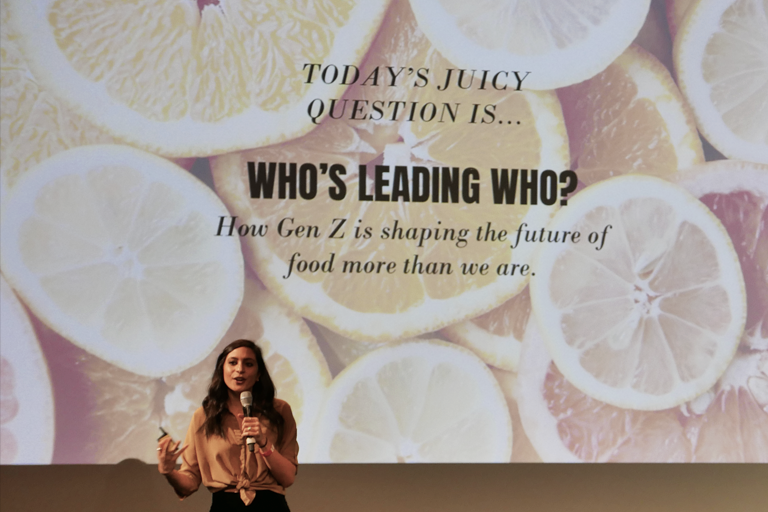
On Gen Z’s Influence on Food Trends
One of the first speakers to kick off the day spent her time combating the traditional, negative stereotypes of the younger generations in our society. Ambika Gautam Pai, Partner & Co-Head Of Strategy at Wolf & Wilhelmine, discussed the promise of Gen Z and how they are the most diverse generation to ever exist on the planet, and are even creating a new paradigm. Inside this generation, it has become the death of the influencer, she explained, and they are now seeking to look up to individuals who more closely align with our actual values. Within Gen Z, as Ambika put it, “inclusivity is the new exclusivity.”
Learning about Gen Z with @ambikagp. Did you know, “59% of Gen Z wants to work in sustainability”? This socially conscious generation is going to shake up many industries, including food! #Bitten2018 pic.twitter.com/D0kFSN7f1h
— Sociality Squared (@Sociality2) November 1, 2018
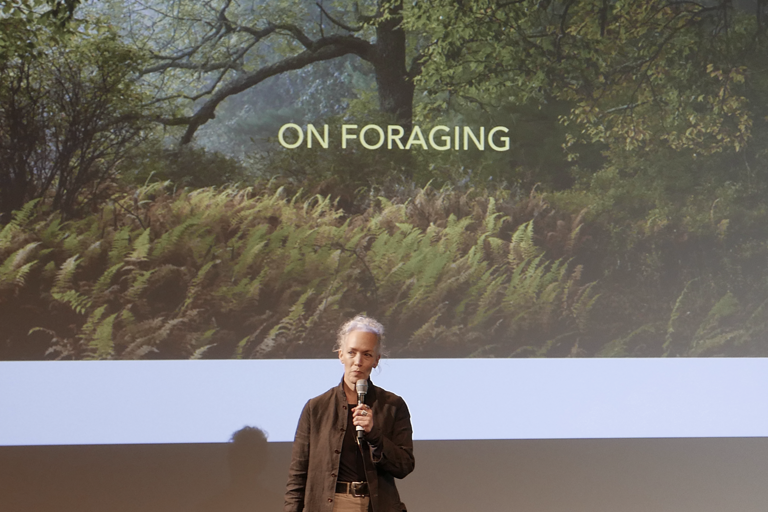
On Foraging
Another unique topic was that of Laura Silverman, the founder of The Outside Institute, who enlightened us all on foraging. As something that you might not think much about living in the big city, she shed light on the three different kinds of today’s foragers – survivalists, back to the landers, and hipsters/elites. No matter how they categorize themselves, their common strand is the underlying commitment to eating equally. However, with today’s society being so wrapped up on the convenience of things, why forage? “Simple,” Laura said, “not only for environmentalism reasons, but for the bliss of it, for countless health reasons, and lastly, to thrill our jaded palettes with one-of-a-kind flavors.”
Laura actually hosts workshops and tours through The Outside Institute for those interested in learning the ropes of foraging, and getting a chance to experience eating something that you personally hand-picked. Although we didn’t get a chance to get our hands dirty during the conference, we did get a taste of foraging at lunch, where Laura was offering tea and popcorn, seasoned and flavored with items that she had foraged herself.
This prez makes me want to go on a hike! Can’t wait to try @glutton4life’s pine needle tea! #bitten2018 @thisisbitten pic.twitter.com/URkQmiYapU
— Helen Todd (@helenstravels) November 1, 2018
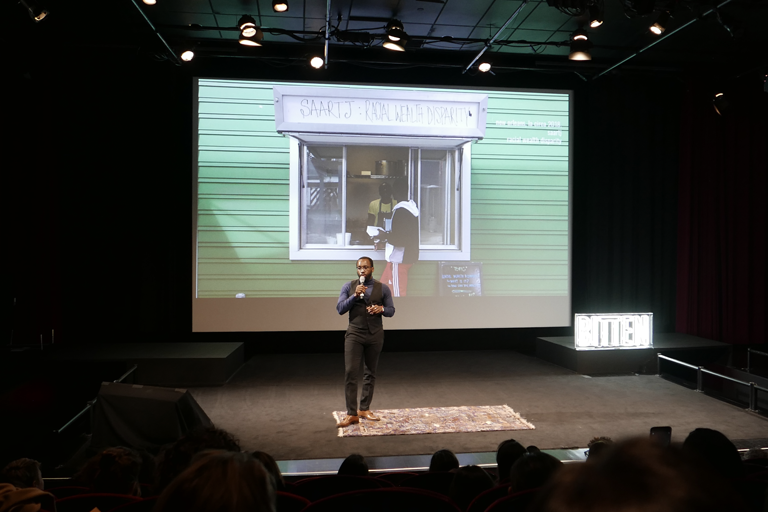
On Justice Through Food Experiences
Tunde Wey, writer and chef, challenged us to use food in an entirely new perspective. He has a dedicated passion for using food to interrogate systems of power and issues prevalent within today’s society. He discussed his work over the years, which specifically disputes race and global capitalism issues through his skills and passions as a chef. One example he gave was his New Orleans restaurant that charged white customers differently than black ones to reflect the income disparity in the neighborhood. In the words of Tunde, “Power concedes nothing.”
“We have a responsibility to help those who are disadvantaged by our privilege.” Tunde Wey showing how it can be done through food. #bitten2018 @thisisbitten pic.twitter.com/r37BE88BSY
— Lisa Akey (@LisaAkey) November 1, 2018
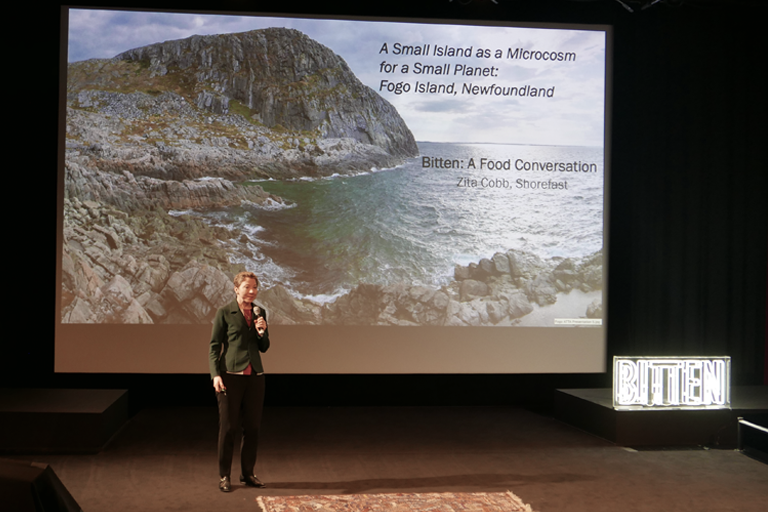
On Fogo Island, a Microcosm of the Planet
Zita Cobb, founder & CEO of Shorefest | Inkeeper, Fogo Island Inn, took the audience on a journey through her own personal background growing up on Fogo Island, a small island in Newfoundland, and the struggles that they had with limited food supply. She now owns and operates a successful inn on the island, and it has become quite the tourist destination. Zita explained Economic Nutrition Labels, an extremely interesting concept that they practice on Fogo Island, which details where all of your money goes when you make a purchase on the island. She showed us an example of a label for a nightly stay at the Inn, which broke down which percentage of your money went to labour, food, commissions, sales/marketing, etc. This economic nutrition label is something that we have never seen done this way before, and most definitely offered a new level of transparency that could be extremely valuable for building strong business consumer relationships.
Learning about the ecosystem on Fogo Island is enlightening. They use these economic nutrition labels so you know where your money goes when you purchase something. #Bitten2018 pic.twitter.com/PzfREqpTKX
— Sociality Squared (@Sociality2) November 1, 2018
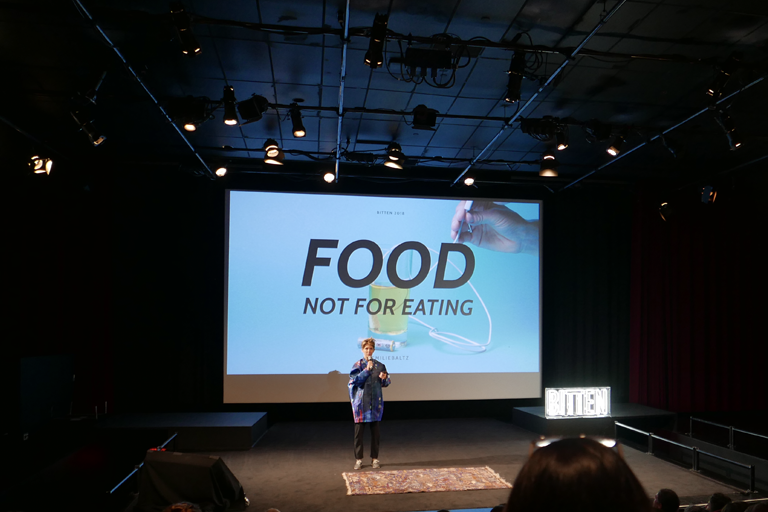
Contrasting such a practical topic, was Artist & Designer Emilie Baltz’s talk on food as art. She spent her time discussing the intersection of art, food and our society, and how she believes that food is our universal human behavior, something that truly, universally stitches us as humans together. Emilie shared a wide variety of creative and beautiful food-oriented projects and pieces, and left us all aesthetically pleased, and despite our heavenly lunch, maybe even a little hungry.
Food as art, as a conversation starter, as a form for awareness. Thanks, @emiliebaltz for the incredible insights into food as it relates to art and culture here at @thisisbitten. #Bitten2018 pic.twitter.com/h31Q9fUVwp
— Sociality Squared (@Sociality2) November 1, 2018
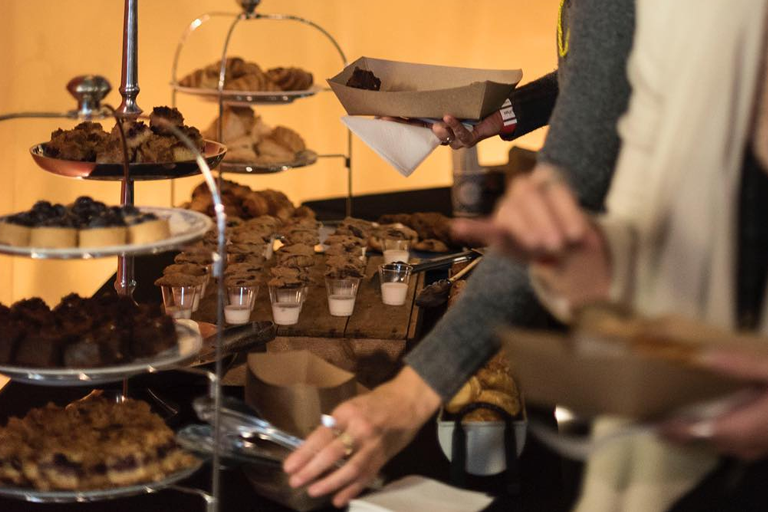
Photo by Liz Clayman
The day was broken up with a mouthwatering lunch, catered by Maman. The lunch (and breakfast before the conference began) offered an impressive variety of wholesome eats that tasted delicious and were Instagram-worthy. The spread was incredibly impressive, and let’s just say S2 will be visiting Maman more often!
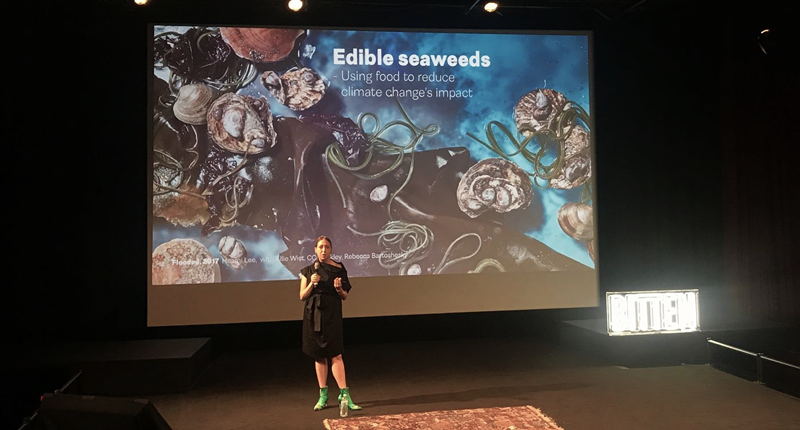
On Food & Climate Change: Visualizing the Future
Allie Wist, Editor of FoodFutureCo., examined the very real issue of climate change, and how it will affect our dinner plates. She asked, “Not only how will our climate change, but how will it taste?” She believes the future of food is in things such a bivalves (like oysters), as they are incredibly restorative. Also, delicacies such as coffee and chocolate are threatened by the rising heat, however, if it comes to that (don’t panic, chocolate lovers) she believes that we can get creative enough to enjoy replicates that taste essentially the same.
“I encourage you to eat provocatively.” @AllieWist on sustainable diets and envisioning new food concepts to chew (and eat) on them now. #bitten2018 pic.twitter.com/gsbAnHHwIj
— Helen Todd (@helenstravels) November 1, 2018

We were also immersed with some more enlightening content on how to make tea and the history behind it from Elena Liao, founder of Té Company. We were warned to be cautious and educated on our seafood, as “the average seafood travels 4,500 miles before it reaches our plate, one third of it is mislabeled, and the brutally honest truth of the disconnect we have from our food, as 90% of all our seafood is imported from another country,” Julianna Fischer, Community Organizer, Northwest Atlantic Marine Alliance revealed.
Learning more about tea from @tecompany. #bitten2018 pic.twitter.com/m25VZCLyaN
— Helen Todd (@helenstravels) November 1, 2018
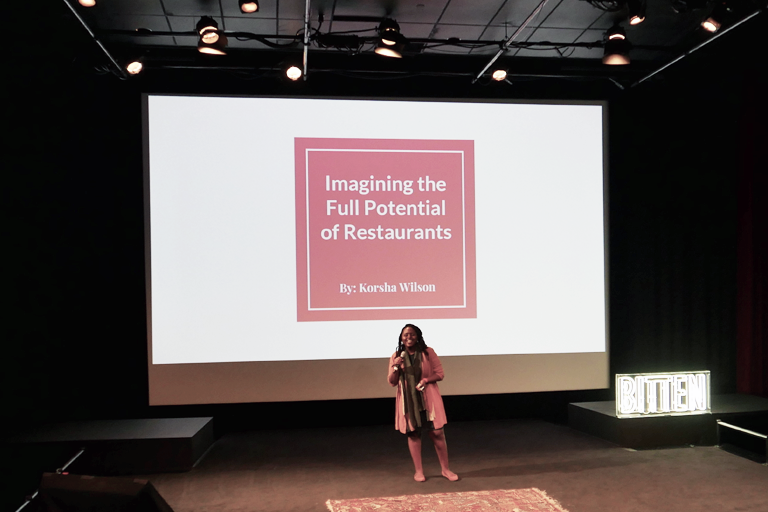
On Imagining the Full Potential of Restaurants
We were educated not only on the future of restorative food, but on the future of restorative restaurants as well. Korsha Wilson, writer and host of A Hungry Society, talked about how restaurants can not only be restorative for those that work in them, but also for those who dine in them. Korsha spent her time encouraging us to take a deeper look into the restaurant experience as a whole, and specifically their potential to be vessels for positive change in society. “There is a great need for more equitable restaurants in the country, and therefore creating equal community spaces,” she further explained.
It was wonderful to hear what @korshawilson’s vision is for the future of restaurants. Hint: community is key. #Bitten2018 https://t.co/RSyLz41XSi
— Sociality Squared (@Sociality2) November 1, 2018
Each talk was unique and interesting in its own way. Thank you Naz Riahi for hosting yet another inspiring conference that left both our minds and bellies satisfied. Can’t wait for next year!
Check out our Highlights on Instagram and follow us on Twitter where we live tweet events and industry insights.
